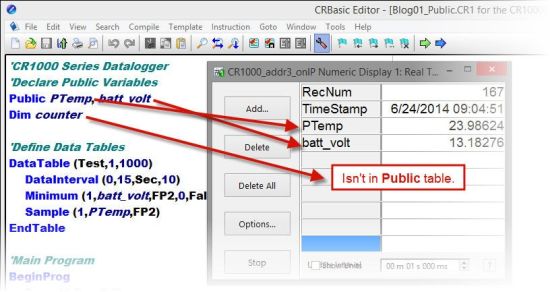Going Public with Your Variables in CRBasic
de Janet Albers | Atualizada: 05/29/2015 | Comentários: 0
When programming your Campbell Scientific data logger, have you ever wondered whether you should be using a Dim variable declaration or a Public one? What is the difference between them, and when is it best to use each one?
Dim and Public variables are temporary holding locations for values that normally vary during program execution. These values are typically the result of measurements and processing or calculations.
The main difference between a Dim and a Public variable is that Dim variables do not show up in the Public table. Your program can still write to, read from, and store data from Dim variables.

Tip: Variable names, both Dim and Public, are not case sensitive.
In general, during program development you can’t go wrong declaring all variables as Public. That way, you can monitor the Public table while testing and see exactly what’s going on. After your program is running as designed, you can clean up the Public table by using the Dim declaration for variables that you don’t need to monitor as closely. Oftentimes I’ll use Dim variables for scratch calculations, loop counters, and when the Public table gets very large.
















 Janet Albers, now retired, was a Senior Technical Writer. She enjoyed sharing tips, simplifying concepts, and guiding our clients to a successful project. She had been with Campbell Scientific, Inc. longer than the CR1000, but not quite as long as the CR10X. After work hours, Janet enjoyed the outdoors with her boys and dogs.
Janet Albers, now retired, was a Senior Technical Writer. She enjoyed sharing tips, simplifying concepts, and guiding our clients to a successful project. She had been with Campbell Scientific, Inc. longer than the CR1000, but not quite as long as the CR10X. After work hours, Janet enjoyed the outdoors with her boys and dogs.
Comentários
Please log in or register to comment.